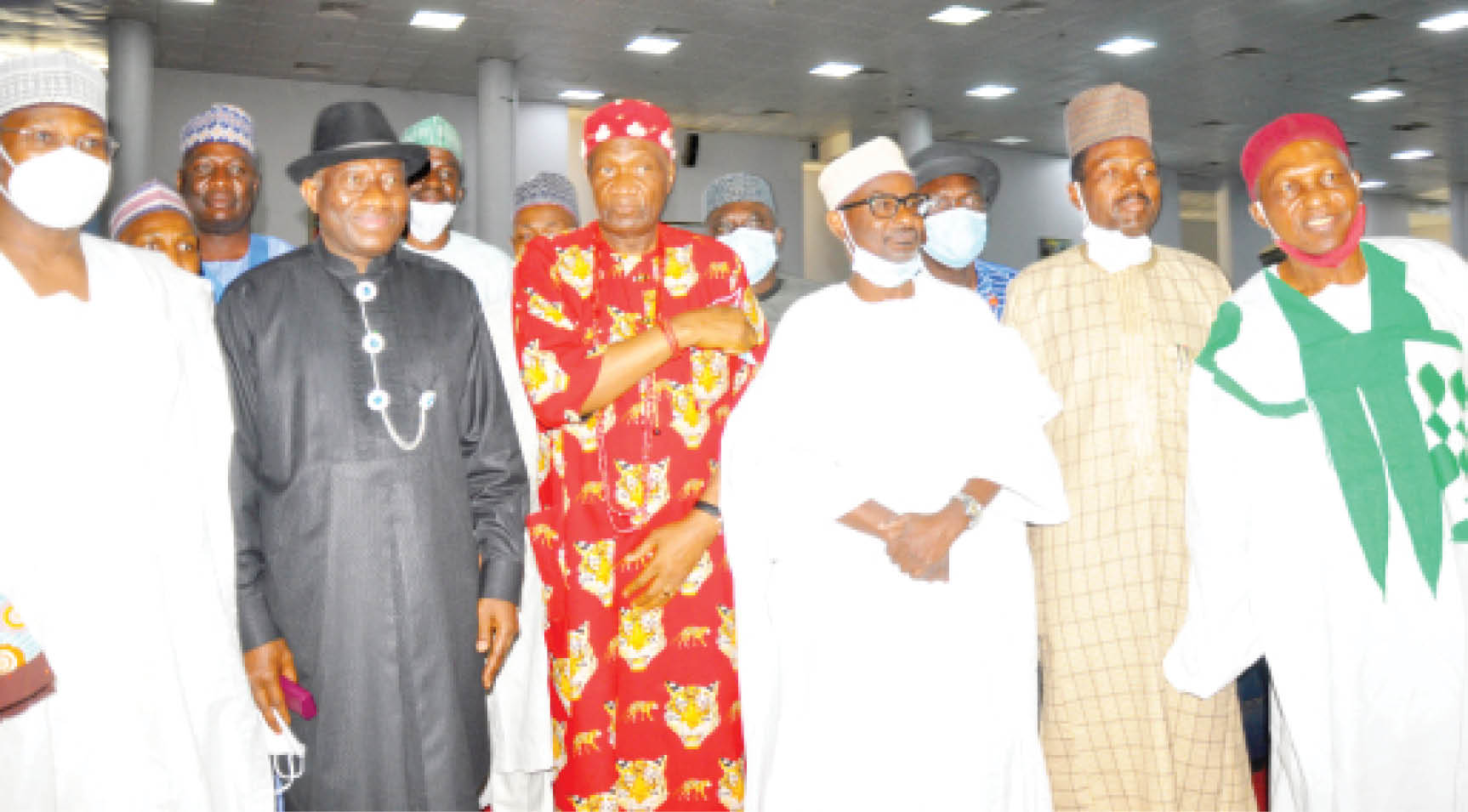Jega, Nwodo, Adebanjo: Restructure Nigeria now
Key speakers at the 18th Daily Trust Annual Dialogue backed restructuring of the country.

From left: former INEC Chairman, Attahiru Jega; former President Goodluck Jonathan; former President-General of Ohanaeze Ndigbo, John Nwodo; Chairman Media Trust Ltd, Mallam Kabiru Yusuf; former Minister of Information, Labaran Maku and former Minister of State for Health, Gabriel Aduku at the 18th Daily Trust Dialogue in Abuja yesterday
Photo: Felix Onigbinde
Key speakers at the 18th Daily Trust Annual Dialogue held in Abuja on Thursday backed restructuring of the country, insisting that the time to do so was now.
This year’s edition of the annual dialogue with the theme: “Restructuring: Why? When? How?” which held at the NAF Conference Centre Abuja, was chaired by former President Goodluck Ebele Jonathan, who pointed out that Nigeria also needed an attitudinal change from its citizens to make it work.
- Discipline, sincerity, security will rescue Nigeria – North Central Forum
- Nigeria’s federalism defective – Prof Jega
A former Chairman of the Independent National Electoral Commission (INEC), Prof Attahiru Jega, who was one of the Guest Speaker’s at the occasion said there was an urgent need to restructure Nigeria to proactively block what he referred to as “irredentist tendencies” and facilitate stable socioeconomic development in the country.
Jega, a Professor of Political Science at the Bayero University, Kano (BUK), argued that it was necessary to find practical ways of restructuring Nigeria before the 2023 general election, saying that the country operates one of the worst models of a federal system of government in the world today.
He said: “Technically and substantively, Nigeria is a federation and operates a federal system with states as the federating units.
“However, among the federations that currently exist in the world (according to the Forum of Federations, about 25 countries, representing 40 per cent of the world population); Nigeria is one of the worst models of political accommodation of diversity as well as power and resources sharing.”
Imbalance in the system
Jega said the necessity of redressing the imbalance and inequities embedded in Nigeria’s current federal system had been ignored for too long, adding that; “any further neglect may imperil the efficacy and viability of the Nigerian federation.”
Another Guest Speaker and leader of the Pan-Yoruba socio-cultural group, Afenifere, Pa. Ayo Adebanjo, said restructuring was necessary because the constitution currently being used is fraudulent and not people-oriented.
According to him, “Restructuring is to say we want the constitution that everybody agreed to, that gives peace and unity in the country.
“And when we talk of federalism, there is a political philosophy behind it. It is not just a philosophy that you just receive from the air.
“It is a well-known principle that in a heterogeneous society like Nigeria, the unitary form of government that we are using now will not work and it cannot work.
“Restructuring is important now; we should go back to federalism.”
On his part, the immediate past President of the Igbo socio-cultural organisation, Ohaneze N’Igbo, John Nnia Nwodo said there was no alternative to restructuring Nigeria because oil revenue was a fast-drying resource for foreign exchange earnings as many countries had set deadlines for the use of alternative energy sources.
He warned that Nigeria would never have a country that commanded the loyalty of its citizens because it had no constitution agreed upon by the people, stressing that the proliferation of states and the high recurrent expenditure of running the federation “is not beneficial to anybody in creating quality life for the people.”
According to him, “You cannot build on quicksand; the country cannot live on falsehood.
“Owners of the country as represented by the various socio-cultural groups that formed the desire to be one country have to be constituted into the kind of conference that President Jonathan summoned,” Nwodo said.
‘Eliminate disunity, tribalism’
Former President Goodluck Jonathan in his address at the occasion called on leaders and the citizens to first address fundamental issues of disunity, nepotism and patriotism, which he said were necessary towards restructuring Nigeria.
“We cannot restructure in isolation without tackling the challenges that polarise our nation.
“These include nepotism, ethnic and religious differences as well as lack of patriotism.
“My conviction is that discussion on restructuring will not help except we restructure our minds because some of the challenging issues at the national level still exist at the state and local levels,” he said.
Jonathan, who led Nigeria between 2010 and 2015, pointed out that it was not easy for some persons to win an election in some states because of the area they come from, the language they speak, or their religious belief.
He also cited cases of local government elections where it was difficult for an opposition party to win a chairmanship or councillorship seat even when such party may have won some seats in the state and National Assembly elections organised by the federal electoral body.
“This shows that restructuring alone may not solve all the anomalies in the system.
“I believe that restructuring for a better nation is good but there are other fundamental issues we should also address,” he said.
“In charting a way forward, the former president gave the case studies of Ghana and Tanzania, which he said had excelled in their democratic process because they embraced reforms that tackled the problems of diversity, bigotry, nepotism and other fundamental issues at independence.
He said: “Both Julius Nyerere of Tanzania and Kwame Nkrumah of Ghana emphasised strong national governments to promote national unity and patriotism, which departed from our regional approach, which was based on strong regional parties and political competition for power between regions.”
Almost all those that spoke at the event agreed that Nigeria required some restructuring even though their perspectives as to how to achieve it differed.
By Fidelis Mac-Leva, Simon Echewofun Sunday, John C. Azu & Abdullateef Aliyu
